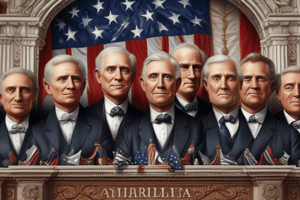Podcast
Questions and Answers
Which of the following individuals was NOT associated with the 'Law and Order' policy?
Which of the following individuals was NOT associated with the 'Law and Order' policy?
- George Wallace
- Henry Kissinger (correct)
- Richard J.Daley
- Hubert Humphrey
What was the primary goal of Nixon's 'New Federalism' policy?
What was the primary goal of Nixon's 'New Federalism' policy?
- To distribute a portion of federal power to state and local governments (correct)
- To increase federal funding for social programs
- To implement a national healthcare system
- To reduce the national debt
Which of the following terms best describes the economic situation characterized by high inflation and high unemployment?
Which of the following terms best describes the economic situation characterized by high inflation and high unemployment?
- Inflationary spiral
- Recession
- Stagflation (correct)
- Depression
What was the primary purpose of Nixon's 'Family Assistance Plan'?
What was the primary purpose of Nixon's 'Family Assistance Plan'?
What was the primary goal of Nixon's foreign policy approach, known as 'Realpolitik'?
What was the primary goal of Nixon's foreign policy approach, known as 'Realpolitik'?
What was the main goal of Nixon's visit to China?
What was the main goal of Nixon's visit to China?
What was the primary function of the Plumbers?
What was the primary function of the Plumbers?
Who was the special prosecutor appointed to investigate the Watergate scandal?
Who was the special prosecutor appointed to investigate the Watergate scandal?
What was the outcome of the Saturday Night Massacre?
What was the outcome of the Saturday Night Massacre?
What were the Nixon Tapes primarily used for?
What were the Nixon Tapes primarily used for?
Flashcards are hidden until you start studying
Study Notes
Key Figures
- Hubert Humphrey: Johnson's VP
- Richard J. Daley: Chicago's mayor
- George Wallace: former Alabama governor
- Henry Kissinger: Nixon's special advisor on foreign affairs
- Leonid Brezhnev: General Secretary of the Communist Party of the Soviet Union
- Bob Woodward & Carl Bernstein: two reporters from the Washington Post
- George McGovern: senator, example of modern American liberalism, opposition to growing US involvement in Vietnam War
- John Sirica: judge for Watergate, believed the men did not act alone
- Sam Ervin: chaired Watergate hearing
- Archibald Cox: special prosecutor to investigate the case
- Spiro Agnew: combative vice president
- General Ford: 38th president of the US
Nixon's Domestic Policies
- New Federalism: distribute a portion of federal power to state and local governments
- Revenue sharing: state and local government should send their federal dollars however they saw fit within certain limitations
- Welfare Reform: Nixon's attempt to reform welfare, which he believed had grown cumbersome and inefficient
- Family Assistance Plan: every family of four with no outside income would receive a basic federal payment of $1600 a year with a provision to earn up to $4000 a year in supplemental income
- Federal Spending on Social Programs: Nixon integrated social security, Medicare, and Medicaid, made food stamps more accessible
- Impoundment and the courts: courts ruled the presidential impoundment was unconstitutional
Law and Order, and the Silent Majority
- "Law and Order": Daley valued, emphasizing the need for order in the country
- Silent Majority: Middle Class Americans who wanted order restored to a country beset by urban riots and anti-war demonstrations
Civil Rights and the Southern Strategy
- Nixon's approach to civil rights: employed his southern approach to obtain political support from white southern voters
- Busing: school districts may bus students to other schools to end the pattern of all-black and all-white educational institutes
- The Southern Strategy: Nixon tried to attract Southern conservative Democrats by appealing to their unhappiness with federal desegregation policies and federal supreme court
Economy and Foreign Policy
- Stagflation: high inflation + high unemployment
- Causes of Stagflation: high inflation, increased competition in international trade, flood of new workers
- OPEC: Organization of Petroleum Exporting Countries
- Realpolitik and the Cold War: foreign policy should be based solely on consideration of power, not ideals or moral principles
- Detente: a policy aimed at easing Cold War tensions, more flexible approach to dealing with communists
- Nixon's Visit to China: to seek the normalization of relations between the two countries
- SALT I Treaty: strategic arms limitation rules, five-year agreement limited the number of intercontinental ballistic missiles and submarine-launched missiles to 1972 levels
The Watergate Scandal
- Imperial Presidency: executive branch became the most powerful branch when Nixon took office
- The President's Men: small and fiercely loyal group of advisors
- The Plumbers: tasked to find out who was giving out classified information
- The Committee to Reelect the President: Nixon's reelection campaign
- Saturday Night Massacre: Nixon ordered Attorney General Richardson to fire Cox, Richardson refused and resigned
- The Nixon Tapes: the tapes were the key to revealing that Nixon knew and when he knew it
- Impeachment charges: obstruction of justice, abuse of power for political purposes, defying judiciary committee subpoenas, tax evasion
Studying That Suits You
Use AI to generate personalized quizzes and flashcards to suit your learning preferences.




